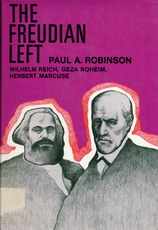
The Freudian Left
Wilhelm Reich, Geza Roheim, Herbert Marcuse
Robinson, Paul A.
Publisher: Harper & Row, New York, USA
Year Published: 1969
Pages: 254pp Dewey: 150.92
Resource Type: Book
Cx Number: CX6301
Paul Robinson tries to define a particular tradition in the history of psychoanalysis - the "radical" or "left-wing" tradition - through an analysis of its three most important representatives: Wilhelm Reich, Geza Roheim, and Herbert Marcuse.
Abstract:
Paul Robinson tries to define a particular tradition in the history of psychoanalysis - the "radical" or "left-wing" tradition - through an analysis of its three most important representatives: Wilhelm Reich, Geza Roheim, and Herbert Marcuse. The book is divided into three parts, each part being an intellectual biography of one of these thinkers. The biographies show the development of the radical tradition in psychoanalysis from the 1920s to the 1960s. These intellectuals explored the radical potential of psychoanalytic theory and "the result of their collective endeavors was to offer a corrective to the prevailing interpretation of Freud as conservative." These three men have been chosen by Robinson because of their sexual radicalism, "their belief that sexual pleasure is the ultimate measure of human happiness." The author analyzes each thinker's development into a Freudian radical and makes a comparative examination of their respective brands of radicalism. He also connects the evolution of the radical tradition to the development of the psychoanalytic movement as a whole.
[Abstract by Nabeeha Chaudhary]
Table of Contents
Acknowledgements
Preface
Introduction: Freudian Radicalism
Wilhelm Reich
Geza Roheim
Herbert Marcuse
Index
Subject Headings


